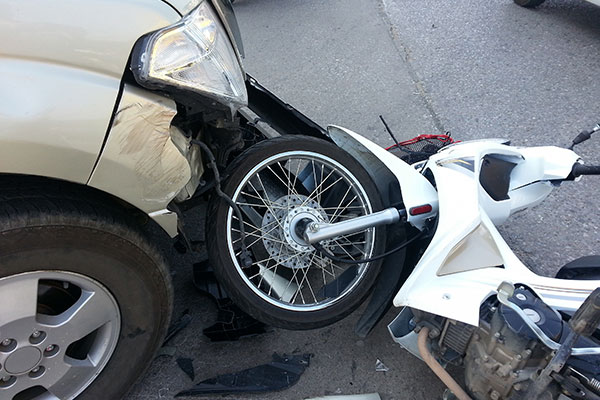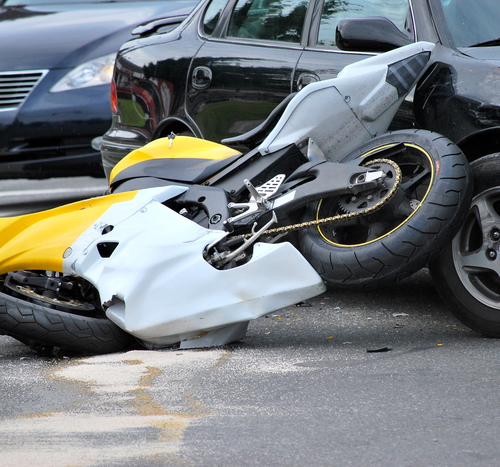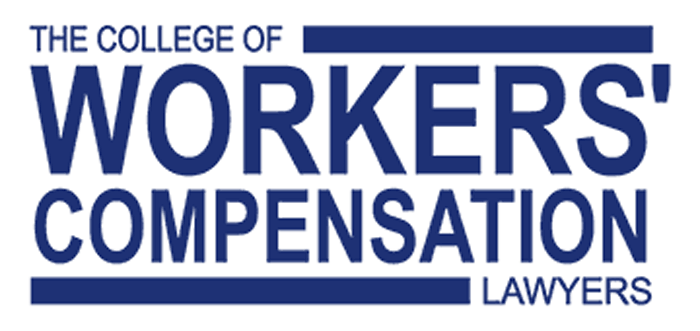There’s nothing quite like the experience of flying down the open road on a motorcycle. The freedom, adrenaline and peace that comes with riding your bike can be addicting.
But riding a motorcycle has a dark side.
According to the National Highway Traffic Safety Administration (NHTSA), around 5,000 motorcyclists lose their lives every year in the United States. Proportionally, motorcyclists are more likely to be injured or die in crashes. Although motorcycles made up just 3 percent of all registered vehicles in the United States in 2017, they accounted for 14 percent of all traffic fatalities. Whenever a motorcyclist hits the road, they are about 6 times more likely to be killed than someone in a passenger vehicle.
While these facts are distressing, they pale in comparison to the stress and anxiety you may experience in the aftermath of a motorcycle accident. These serious crashes can cause devastating long-term physical, emotional and financial impacts.
At Finderson Law, our Fort Wayne personal injury lawyers have dedicated more than 25 years to helping injured riders recover from motorcycle accidents. As experienced and tireless advocates, we know how to protect injured riders’ rights and help them pursue all available legal remedies for financial recovery. We build the strongest possible cases for our clients so that they can obtain the full compensation and justice they deserve.


Do I Have a Motorcycle Accident Claim?
Whether or not an injured rider is entitled to compensation for a motorcycle wreck will primarily depend on the exact cause(s) of the crash. Some common bases for motorcycle claims can include (and are not limited to):
This can include the careless or reckless actions of truckers, passenger vehicle drivers or others on the road. Drunk driving, distracted driving, speeding and otherwise failing to abide by traffic laws are just a few examples of how another person’s negligence can cause motorcycle accidents.
Faulty brakes, poorly-made tires and other equipment-related problems can also be the basis for a motorcycle crash claim. In these cases, the equipment manufacturer can be liable under product liability law.
Broken signals, unmarked lanes, potholes and a lack of road signs can make the roads unsafe and contribute to motorcycle crashes. In these cases, the city or other municipal agency may be responsible for failing to maintain the roads.
The best way to find out if you have a motorcycle claim is to contact a lawyer at Finderson Law.
Who’s Liable for My Motorcycle Accident Injuries?
Various parties might be liable for a motorcycle accident, depending on the unique circumstance surrounding the case. For instance, if a motorcycle crash is caused by a truck driver, the trucker and possibly the trucking company may be liable for the accident (depending on the details). If the wreck was caused by a defective part, the manufacturer may be responsible. If another driver hit a motorcyclist, then their insurance company should pay for the damages.
It’s important to point out that even if the motorcyclist was partially to blame for the crash, they may still be entitled to compensation for their injuries and losses as long as they were less than 51 percent at fault for the crash. This is because Indiana follows the modified comparative fault 51 percent bar rule.
What to Do After a Motorcycle Wreck [6 Steps]
When a motorcycle crash happens, knowing what to do immediately after the wreck can be critical to protecting yourself, as well as your rights and a future claim. In general, the following are the best steps to take after a motorcycle crash:
1. Call the police and wait at the scene.
Whether the accident was minor, serious or deadly, you should dial 911 or a non-emergency phone number to call local police and law enforcement to the accident scene. If you or someone else were hurt, be sure to tell the dispatcher so that they know to send an ambulance. If everyone seems unharmed and the crash happened in the Fort Wayne area, you can dial the non-emergency number (260) 427-1222 to reach the police desk or (260) 449-7535 for the Allen County Sheriff’s Office.
If possible, leave your motorcycle or vehicle (and any wreckage) where it sits until photos are taken and/or police have had a chance to investigate the crash scene. If the accident occurs in the path of traffic, you can move to the shoulder (or a safe area nearby) and wait at the scene until the police arrive. Don’t leave until they say it’s safe to do so. Leaving the scene of an accident you’re involved in is considered a “hit-and-run,” which is a criminal offense in Indiana.
Indiana accident reporting requirements
When do you have to report a motorcycle accident in Indiana?
State law says that you are required to report any crash that involves the injury, death or entrapment of any person involved in the wreck. In addition, you must report any auto accident that results in property damage (not counting the vehicles involved).
However, even if you are involved in a minor collision with no injuries and little to no damage, it’s in your best interest to report the accident anyways. If you later decide to pursue compensation from the other driver or an insurance company, the police report will be a key piece of evidence to obtain damages.
2. Get medical attention.
If you feel pain after a wreck, it’s vital that you avoid moving. Wait for emergency responders and paramedics to arrive and follow their instructions. You may need to be transported to the emergency room or hospital, in which case you can skip down to step 4.
Even if you don’t require emergency medical attention and you feel well enough to walk around, it’s important you get evaluated by a doctor as soon as possible after the accident—that way, the medical professional can provide an accurate assessment of your injuries and, if necessary, provide treatment to prevent additional health complications.
3. Gather information and evidence.
As you wait for the police to arrive or finish their investigation, take as many pictures of the damages as possible, from various angles. Be sure to exchange insurance and contact information with the other involved motorists or parties. Write down their full name, address, phone number, name of their insurance company, policy number, driver’s license number and license plate number.
If there were bystanders or other drivers who witnessed the crash, try to take down their names and contact information as well.
What NOT to do after a motor vehicle accident
Do NOT apologize or admit fault for the crash. When discussing the accident with anyone at the scene (or after), only discuss the facts. Never admit blame or apologize. Though it’s natural for kind people to want to apologize in an uncomfortable and stressful environment, these seemingly harmless admissions can actually be used against you later to try and pin the fault for the accident on you (even if another party may have caused the wreck).
4. Notify your insurance company.
Report the facts of the accident to your auto insurance provider. You’ll need to file an accident report with your insurer even if you weren’t responsible for the wreck. Do this as soon as possible because waiting too long to notify your insurer may result in your claim being questioned or rejected. Stick to the facts and don’t agree to give a recorded statement until you’ve had a chance to speak with an attorney.
5. Save all accident-related correspondence.
Collect and keep any and all information, evidence or correspondence related to the crash. This might include your crash photos, police reports, letters from insurers, doctors’ bills, car repair bills, etc. You may even want to make copies or create electronic backups of this evidence (in case anything gets misplaced later). Also, it’s a good idea to keep all of this in one place (like a file folder) so that you and your attorney can readily access it at any point moving forward.
6. Contact an attorney to discuss your best options for financial recovery.
An attorney who is experienced in motorcycle accident cases can be an important ally in the aftermath of your wreck. Their job is to represent you and you alone, and ensure you get a fair shake in the end. At Finderson Law, our attorneys can explain Indiana law, your rights and your available legal remedies.
How a Fort Wayne Motorcycle Accident Lawyer Can Help You With Your Claim
It’s easy to feel overwhelmed after a serious motorcycle accident. It’s important that you take the time needed to focus on your physical and emotional recovery (or grieve the loss of a loved one killed in a fatal crash). However, there are also important legal deadlines and steps that must be considered.
The right attorney can do a lot for you during this difficult time by taking care of the time-consuming and confusing details related to your motorcycle accident compensation, including (but not exclusive to):
- Explaining your rights and the law
- Determining all parties who are liable for the crash
- Compiling all of the evidence necessary to support your claim
- Protecting your claim when dealing with insurers
- Advocating your rights while guiding you through the recovery process
- Working relentlessly to keep your claim moving forward to the best possible resolution
How much time do I have to file a motorcycle accident claim in Indiana?
In most personal injury cases (including motorcycle injury lawsuits), you have 2 years from the date of an accident to file a claim against the negligent party. This deadline, known as the “statute of limitations,” is strictly enforced and there are few exceptions. The sooner you talk to one of our attorneys, the more time we have to determine if you have a claim and build a strong case.
Motorcycle Accident Compensation & Damages
Soon after a motorcycle crash, you will probably start receiving bills in the mail from medical providers, repair shops, insurance companies and others related to your accident injuries and damages. These bills can add up quickly and be shockingly high, resulting in further anxiety and stress—especially if you are still unable to work due to your injuries.
We can help you receive the following damages by negotiating with insurers and, if necessary, pursuing a personal injury lawsuit against the at-fault driver:
- Medical bills (past and future)
- Prescription costs
- Lost wages and income (past and future)
- Pain and suffering
- Disfigurement and scarring
- Disability
- Vehicle and property damage
- Loss of companionship or consortium
- Funeral and burial expenses (in the event of wrongful death)
In addition, punitive damages may be awarded in certain cases where a person’s conduct was particularly egregious and malicious, but there are special rules and requirements for those damage claims.
Indiana Motorcycle Accident Injury Guide
Motorcycle accidents are stressful. Adding to the anxiety is the many confusing steps, deadlines and laws that you must consider if you wish to pursue a personal injury claim for your damages—all while you are trying to recover physically and emotionally. What’s more, each state’s laws differ when it comes to compensation for motorcycle injury claims.
You probably have lots of questions, and we have answers! Since no 2 cases are exactly alike, it’s best to consult with an experienced motorcycle crash attorney near you for advice and guidance on your unique case. Here at Finderson Law, your first consultation is free, so you have nothing to lose and much to gain by contacting us.
In the meantime, we invite you to browse the articles and resources below for more answers, information and advice.
- What are the Common Causes of Motorcycle Accidents?
- What are Common Motorcycle Accident Injuries?
- How Do Motorcycle Wrecks Differ from Car Accidents?
- What are Common Motorcycle Accident Defenses Your Attorney Needs to Beat?
- What are Indiana Motorcycle Laws?
Ready to Talk to a Knowledgeable Fort Wayne Motorcycle Accident Lawyer?
If you or someone you love has been hurt in any type of motorcycle wreck, we invite you to contact a Fort Wayne motorcycle accident lawyer at Finderson Law to get answers to your most pressing questions. With us in your corner, you can rest easy knowing that we’ll provide personal service customized to meet your specific needs and goals, as well as superior representation to position your claim for the maximum possible recovery.
We’ve helped and satisfied hundreds of clients. Our history of providing the highest quality legal services —and delivering exceptional results—has earned us 5-star ratings on Facebook and Google. From our office in Fort Wayne, we are proud to represent clients throughout Allen County and the state of Indiana.
REVIEWS FROM OUR CLIENTS
Great to work with. Went above and beyond to help us. Very professional and personable. They cared about me and getting done what was needed. Would highly recommend this firm. - D.P.
Always on top of the process and keeps in contact. Communication to me is key regardless if they are making progress or not and they were always answering the phone or returning calls promptly and answering any questions along the way. Top notch and while I hope to never use them again, I highly recommend them. Excellent and phenomenal! - H.H.
Roger went above and beyond for me and got me the results I needed. I'm extremely satisfied with how things turned out! Hopefully, I will not have to visit the office again; but, if I do need a lawyer, I know where to go! - T.





 744 E Till Rd, Suite 102
744 E Till Rd, Suite 102
